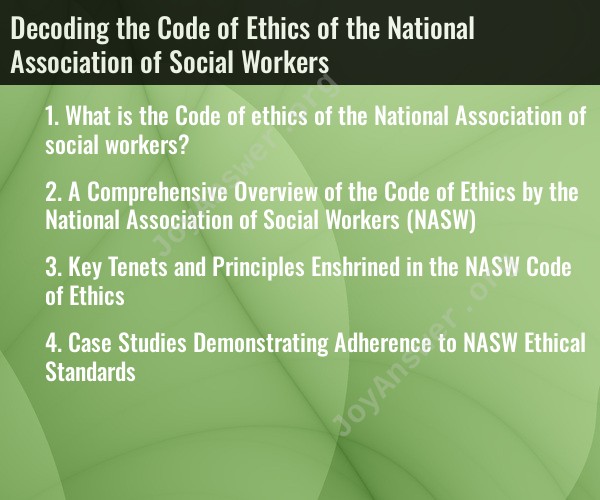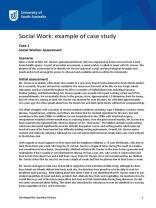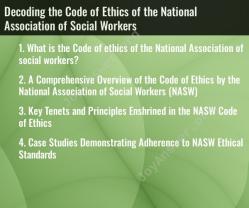What is the Code of ethics of the National Association of social workers?
The Code of Ethics of the National Association of Social Workers (NASW) is a set of guidelines and standards that outlines the ethical principles and values expected of social workers in their professional practice. The NASW Code of Ethics is considered a cornerstone of the social work profession and serves as a guide for ethical decision-making and conduct. The Code was last revised in 2017.
The NASW Code of Ethics is organized into four main sections, each addressing different aspects of social work practice:
Preamble:
- The Preamble introduces the purpose and significance of the NASW Code of Ethics. It emphasizes the core values of the social work profession, including service, social justice, dignity and worth of the person, importance of human relationships, integrity, and competence.
Ethical Principles:
- The Ethical Principles section articulates six core principles that serve as a foundation for ethical social work practice. These principles are:
- Service: Social workers' primary goal is to help people in need and address social problems.
- Social Justice: Social workers challenge social injustice and advocate for equitable access to resources, opportunities, and treatment for all individuals.
- Dignity and Worth of the Person: Social workers respect the inherent dignity and worth of each person and strive to promote clients' self-determination.
- Importance of Human Relationships: Social workers recognize the central role of human relationships in their work and seek to enhance the well-being of individuals and communities through these relationships.
- Integrity: Social workers act with integrity, honesty, and transparency in their professional practice.
- Competence: Social workers strive to maintain and enhance their professional competence and the effectiveness of their services.
- The Ethical Principles section articulates six core principles that serve as a foundation for ethical social work practice. These principles are:
Ethical Standards:
- The Ethical Standards section provides specific guidelines and standards for social work practice. These standards cover a wide range of areas, including confidentiality, informed consent, professional boundaries, cultural competence, ethical decision-making, and conflicts of interest.
Application to Various Contexts:
- The final section of the NASW Code of Ethics addresses the application of ethical principles and standards in different social work contexts. It includes guidelines for social work in various settings, such as clinical practice, administration, research, and social and political action.
Social workers are expected to use the NASW Code of Ethics as a guide in their professional practice and to engage in ongoing ethical reflection and education. The Code is designed to help social workers navigate complex ethical dilemmas, ensure the protection of clients, and uphold the values of the social work profession.
It's important to note that the NASW Code of Ethics is a living document subject to periodic revisions. Social workers are encouraged to familiarize themselves with the most recent version and to stay informed about any updates or changes to the Code.
A Comprehensive Overview of the NASW Code of Ethics
The National Association of Social Workers (NASW) Code of Ethics serves as the compass for professional conduct for social workers in the United States. It outlines core values, principles, and ethical standards that guide social workers in all aspects of their practice, from client interactions to community engagement. Here's a comprehensive overview:
Structure and Purpose:
The Code is divided into six sections:
- Ethical Principles
- Ethical Standards for Social Workers
- Ethical Standards for Social Work Educators
- Ethical Standards for Social Work Organizations
- Procedures for Addressing Ethical Violations
- Guidelines for Ethical Decision-Making
Its purpose is to promote ethical practice within the profession, protect the rights and well-being of clients, and maintain public confidence in social work.
Key Tenets and Principles:
- Six Core Values: Service, Social Justice, Dignity and Worth of the Person, Importance of Human Relationships, Integrity, and Competence.
- Fundamental Principles:
- Client Self-Determination: Respecting clients' right to make their own choices and control their lives.
- Confidentiality: Maintaining the privacy of client information.
- Competence: Providing services within the boundaries of your knowledge and skills.
- Integrity: Acting with honesty, fairness, and respect for others.
- Social Justice: Advocating for equal opportunities and eliminating discrimination.
Case Studies Demonstrating Adherence to NASW Ethical Standards:
Case 1: Duty to Warn - Prioritizing Client Safety:
- A social worker learns a client is planning to harm themselves but faces a confidentiality dilemma due to the client's expressed fear of involuntary hospitalization.
- Adherence to the NASW Code involves balancing confidentiality with the duty to warn. The social worker can seek consultation, contact emergency services if imminent danger persists, and explain the limitations of confidentiality while reassuring the client of support.
Case 2: Cultural Competence - Respecting Diversity:
- A social worker from a predominantly urban background is assigned to a client from a rural community with different cultural customs and beliefs.
- The NASW Code emphasizes cultural competence. The social worker can actively listen, demonstrate respect for the client's cultural values, avoid imposing personal biases, and seek guidance from colleagues or community resources to gain cultural understanding and provide effective services.
Case 3: Conflict of Interest - Maintaining Professional Boundaries:
- A social worker develops a friendship with a client outside of professional settings.
- The NASW Code prohibits dual relationships to avoid conflicts of interest. The social worker should inform the client and supervisor, establish professional boundaries, and consider referring the client to another social worker to avoid compromising the therapeutic relationship.
These are just a few examples, and the application of the NASW Code can vary depending on the specific context and challenges faced by social workers.
Additional Resources:
- NASW Code of Ethics: https://www.socialworkers.org/About/Ethics/Code-of-Ethics
- NASW Center for Ethics and Social Policy: https://www.socialworkers.org/About/Ethics/Code-of-Ethics
I hope this overview provides a good understanding of the NASW Code of Ethics. Feel free to ask any further questions you may have about specific ethical principles or their application in real-world situations.












